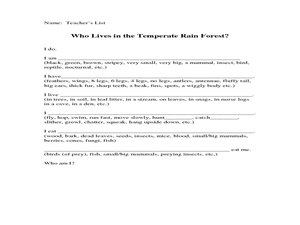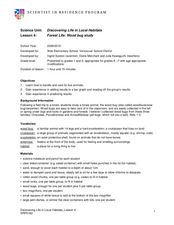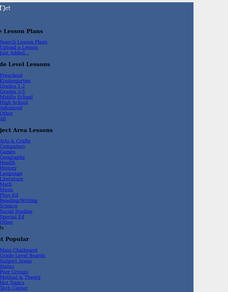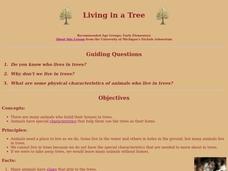Curated OER
Boston Harbor Cruise: A Shoreline Survey
The students take a harbor cruise, photograph, and draw shore line features attending to evidence of human impact/consequences, and its cost on marine/land animal habitats vegetation, weather patterns, signs of erosion, and the water...
Curated OER
Food Chains and Food Webs
Fourth graders investigate food chains. For this living environment lesson, 4th graders begin to understand the interdependence of organisms. Students describe the connections organisms have to the ecosystem. Students research online,...
Curated OER
Lesson Plans for Sweet Dreams: How Animals Sleep
Students explore the sleeping patterns and sleeping habitats of animals. In this where animals sleep lesson, students research different animal species. Students also write and illustrate an animal picture book, make connections...
Curated OER
ENDANGERED SPECIES LESSON
Young scholars, after reading and discussing a science research prompt, gather information about a particular endangered species and present findings to the class, by completing a research workbook and making a realistic sketch of the...
Curated OER
Ants
Third graders study the habits and habitats of ants. They research the use of technology as a valuable investigation tool and access other web sites for future research projects. The students make successful decisions while playing SimAnt.
Curated OER
Layers of the Forest- Leaf Litter
Students conduct an experiment. In this temperate forest lesson, students discuss what kind of animal life can be found in the forest. They read The Magic School Bus Meets the Rot Squad: A Book About Decomposition and complete an...
Curated OER
Layers of the Forest
Students explore rain forests. In this rain forest ecosystems lesson, students identify and describe the layers of the rain forest. Students paint and decorate a large rain forest mural. Students write riddles about animals that...
Curated OER
Our Zoo Friends
First graders plan and create a model zoo depicting the natural habitats of animals. Their models include animals and a display of written factual information about the animals. Students present their project by conductig a tour of...
Curated OER
Habitats Worksheet
In this environment instructional activity, students examine different types of animals that interact with the school environment and students write about some of the possible consequences for the animals.
Curated OER
Forest Life- Wood Bug Study
Examine wood bugs and their habitat. Learners gather wood bugs and examine their bodies. Then discuss their body parts and how they help them survive. They also predict where they think wood bugs live to then graph the class results.
Curated OER
DID YOU HELP CREATE THIS
Students examine whether their actions are positively or negatively affecting organisms and their habitats. They choose an animal to study then create a multimedia presentation including charts and graphs of data logger information and...
Curated OER
Cooperative Learning, Sci., Tech., Lang
Learners research, write, edit, revise and present a paragraph, using word processor, about animal of their choice, including description, where animal lives, what it eats, its habits, e.g. is it endangered, migration, hibernation,...
Curated OER
I spy (Camouflaged Animals in Art!)
Students create a picture of a camouflaged animal in its habitat. In this visual arts lesson plan, students look at Hans Hoffmann's painting A Hare in the Forest and discuss the animal's camouflage. They research their own animal to...
Curated OER
Woodland Animals and Their Habitat
Students explore the natural environment through a video and nature sounds tape. They keep journal's of the unit's activities and vocabulary terms. They play a web of interdependence game and compose a list of forest animals and write...
Curated OER
Living in a Tree
Students explore animals that live in trees. In this nature and biology lesson, students go outdoors and make observations about animals and their unique body parts that help them to live in trees. Students create drawings as they...
Curated OER
Venus Flytrap
Students study the Venus Flytrap including its habitat and how it eats. In this ecology instructional activity students complete several experiments using a Venus Flytrap to see how it reacts to various conditions.
Curated OER
Teaching Kids about the Environment
Fifth graders identify the species of plants and animals found in an environment. They compare these findings to plant and animal species found in an unlike environment. Students acquire and compare soil samples from the two sites chosen.
Curated OER
Through the Eyes of an Owl
Students describe vertebrates in terms of observable body parts and characteristics and describe life cycles of familiar organisms. They identify familiar organisms as part of a food chain or food web and describe their feeding...
Curated OER
Drama in the Refuge
Students write and perform dramatic presentations about the Arctic National Wildlife Refuge. They select formats from puppets, plays, improvisational skits, or screened silhouette.
Curated OER
Animals: Here and Now
Discuss and identify natural habitats of animals commonly found in zoos. The class constructs and displays small "zoo like" models to show a chosen animal habitat. They write a short story or diary about an animal or pet of their choice....
Curated OER
Paper Sculpture Habitats
Students develop skills in sculpture. They acknowledge that sculpture can be made in a variety of ways. Students encounter different ways paper can be manipulated. They gain experience in collaboration.
Curated OER
She Sells Sea Shells in Illinois??
Second graders sorted shells first by methods they thought appropriate and then were instructed on the scientific method of classification by univalve and bivalve. Students then sorted paper shells as a method of assessing knowledge. It...
Curated OER
Habitat Lesson
Students students explore animal habitats, and demonstrate reading comprehension skills, including reading strategies, inference, literal meaning, and critical analysis.
Curated OER
Animal Adaptations
Students will participate in classroom discussions and visit a website to learn more about animals and how well (or poorly) they've adapted to satisfying their needs in their natural habitats. This will help move them toward the goal, in...

























